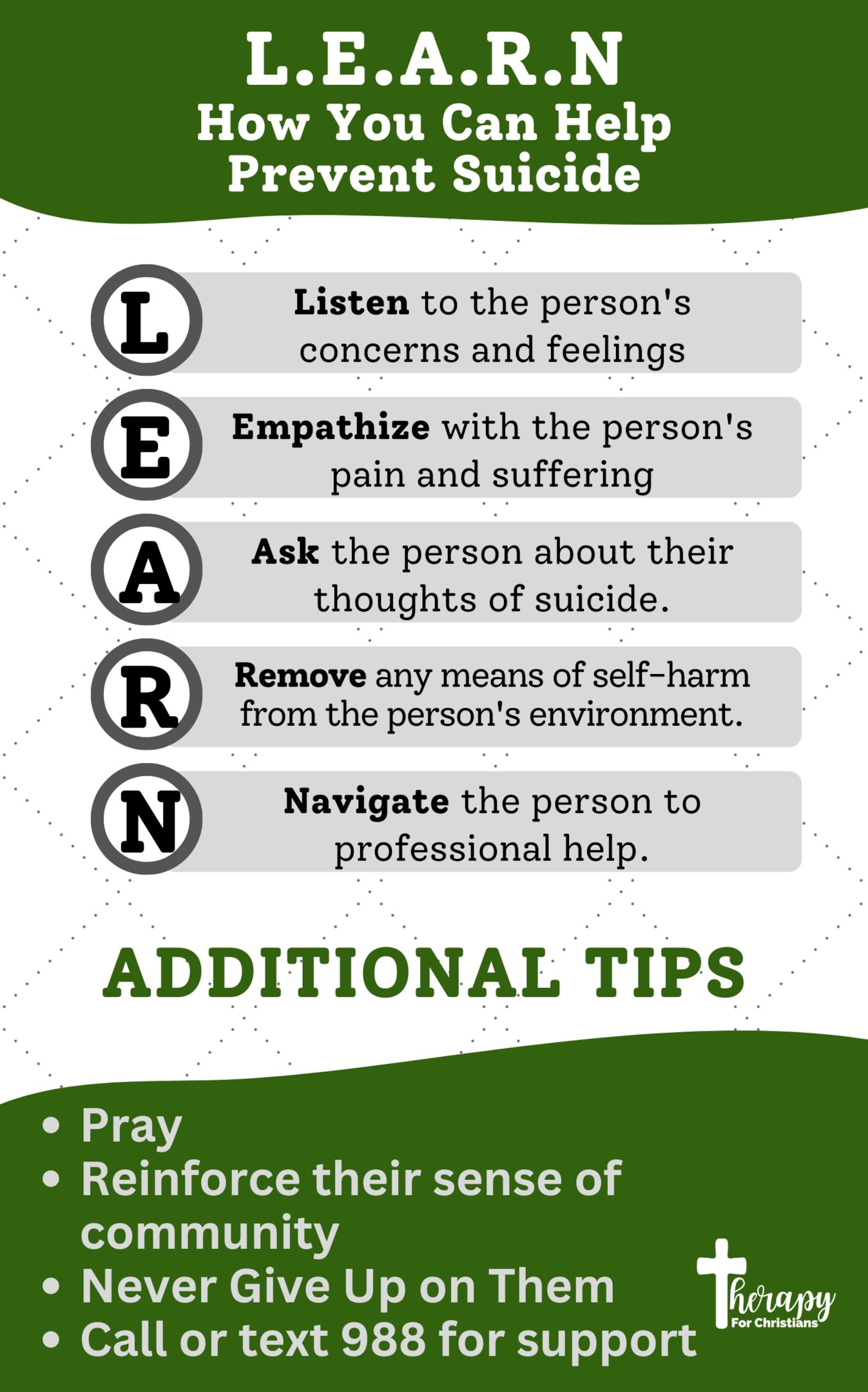
 Suicide is a global health concern that claims an alarming number of lives each year, but many instances can be prevented with appropriate intervention and support. Knowing how to recognize signs of distress and providing the right help can make a significant difference. This guide will offer essential tips on suicide prevention, aiming to empower you with the knowledge and tools to potentially save a life. It's high time we all play an active role in addressing this silent crisis.
Suicide is a global health concern that claims an alarming number of lives each year, but many instances can be prevented with appropriate intervention and support. Knowing how to recognize signs of distress and providing the right help can make a significant difference. This guide will offer essential tips on suicide prevention, aiming to empower you with the knowledge and tools to potentially save a life. It's high time we all play an active role in addressing this silent crisis.

How do you know if someone is at risk for suicide?
Recognizing the signs of emotional distress in someone who may be at risk for suicide is crucial. Here, we will discuss some common indicators that someone may be contemplating suicide.
Expressing thoughts of wanting to die, be dead, or committing suicide
One of the most critical warning signs of suicide is when someone starts to express thoughts of wanting to die, be dead, or commit suicide. This might not always be as straightforward as it sounds, and the person may not directly say these words. They might instead hint at these feelings through comments about feeling hopeless or trapped, believing they're a burden to others, or not seeing a reason to live. It's essential to take these expressions seriously. They signal profound distress and must not be dismissed or ignored.
Engaging in self-injury
Another red flag is when someone engages in self-injury, which often signifies a deeper struggle with emotional pain. This could involve self-harm behaviors like cutting, burning, or other forms of deliberate self-inflicted physical harm. Besides obvious signs of injuries, other indicators might include wearing long sleeves or pants even in hot weather to cover up wounds, unexplained injuries, and finding sharp objects or tools in their belongings. It's crucial to approach these situations with care, compassion, and an aim to guide the person toward professional help.
History of previous suicide attempts
Individuals who have attempted suicide in the past are at higher risk of trying again. It's crucial to take any past suicide attempts seriously and provide appropriate support and intervention. Risk factors like mental health conditions, abuse, trauma, and substance abuse can increase the likelihood of previous suicide attempts. It's essential to address these underlying issues with proper treatment and therapy.
Feeling hopeless about the future
Another warning sign to be aware of is when someone expresses a sense of hopelessness about the future. This might manifest as a belief that things will never get better or that there's no point in trying. They may also feel overwhelmed and unable to see any positive outcomes for their situation. These feelings of hopelessness can contribute to suicidal ideation and should not be ignored.
Experiencing co-occurring emotional and behavioral difficulties
Suicidal thoughts and behaviors often stem from underlying emotional or behavioral difficulties. Some common co-occurring issues include depression, anxiety, substance abuse, trauma, and self-esteem issues. These struggles can be overwhelming and may lead someone to consider suicide as an escape from their pain. It's essential to address these issues with proper treatment and support.
Noticing significant changes
Pay attention to significant changes in mood, behavior, or appearance. For example, someone who was typically outgoing and social might withdraw from activities they once enjoyed. Alternatively, someone may become increasingly reckless or impulsive in their actions. Other changes could include sudden weight loss or gain, changes in sleep patterns, and neglecting personal hygiene. These alterations may signal underlying emotional distress that requires attention.
What Can you Do If You Believe Someone is Suicidal: 5 Tips to Help Prevent Suicide
Forefront has created an easy-to-follow and effective approach, the Forefront Suicide Prevention LEARN® steps. These five steps are designed to empower individuals to guide others toward hope, recovery, and survival.
The L.E.A.R.N. acronym encompasses:
Listen
Listening is a powerful tool that can help you understand someone's feelings and gain insight into their experiences. When someone shares their thoughts of suicide or distress, listen without interrupting and let them know they are being heard.
Empathize
Show empathy by recognizing the person’s pain and offering understanding and validation. Let them know that it’s okay to feel what they’re feeling and that they are not alone.

Ask
It's essential to ask directly about suicidal thoughts and intentions. This can be challenging, but it is necessary to have an open conversation about suicide without judgment or fear.
Remove
If someone has expressed suicidal thoughts or intentions, it's crucial to remove any means of self-harm from their environment. This could include weapons, medications, or other items that could potentially be used in a suicide attempt.
Navigate the person to professional help
Lastly, it's crucial to navigate the person towards professional help. This could include reaching out to a mental health professional. It's essential to follow up and continue supporting the person in their journey towards recovery.
Beyond the LEARN acronym of Preventing Suicide
In addition to the LEARN steps, there are other important actions you can take to help prevent suicide in your community:
Pray
Prayer can be a powerful tool in providing support and strength to those struggling with suicidal thoughts. It's essential to offer prayers for those who are experiencing emotional distress and for their loved ones who may also be affected.
Reinforce their sense of community
Suicidal thoughts can often stem from feelings of isolation and disconnection. It's crucial to let someone know that they are not alone, and there are people who care about them and want to support them. Reinforcing their sense of community can provide a sense of belonging and hope.
Never Give Up on Them
It's important to remember that recovery from suicidal thoughts and behaviors is possible. It takes time and effort, but there is hope for a brighter future. Never give up on someone who is struggling with suicidal thoughts.
FAQs about Suicide Prevention
Now that we've discussed warning signs, risk factors, and steps to help prevent suicide, let's address some frequently asked questions about suicide prevention.
Do they call the police if you call the suicide hotline?
No, the National Suicide Prevention Lifeline (1-800-273-TALK) does not involve law enforcement unless there is an immediate danger to the caller or someone else. The hotline is a confidential and judgement-free space for individuals to seek support and resources. However, if there is an immediate risk of harm, emergency services may be contacted as a precautionary measure.
What constitutes as suicidal thoughts?
Suicidal thoughts are any thoughts or ideas related to ending one's life. These can range from fleeting passing thoughts to detailed plans and intentions for suicide. It's essential to take all suicidal ideation seriously and offer support and intervention.
What happens if you call 988?
The National Suicide Prevention Lifeline can be reached by calling or texting 988. If you or someone you know is having suicidal thoughts, a mental health or drug use crisis, or any other kind of emotional pain, you can get free, live help. Calling or texting 988 has been operational since July 2022 (note, 988 started out as the Lifeline at (800) 273-8255 (TALK) at any time.
When You Dial 988
When you call 988, you'll first hear a message that gives you three options: you can connect to the Veterans Crisis Line, get help in Spanish, or stay on the line while your call is sent to the Lifeline network crisis center closest to you. This is based on the number in your area code. Another choice is the 988 videophone, which is for people who are deaf or hard of hearing.
Your call will go to another Lifeline center if the one closest to you can't answer. The Lifeline network is made up of more than 210 independent crisis centers that are owned and run by people in the area. With the start of 988, the network will grow and get better.
Someone who is trained to help will answer the phone after your call is routed. They will listen, help, and give resources if that's what you need. Their main goal is to help you when you're in trouble.
If the counselor thinks you are in danger, they may talk to you about calling 911 or another local emergency service. But first, they will do everything they can to help you stay safe in a less invasive way. Local emergency forces are only called in about 2% of Lifeline calls, and more than half of those are with the caller's permission.
When You Text 988
Please go to suicidepreventionlifeline.org/chat if you'd rather talk to a counselor online. The Lifeline has had online chat since 2013, and this year they added text and chat services in Spanish.
When you text 988 (you can also chat with a counselor via the computer by visiting suicidepreventionlifeline.org/chat), you will be asked to fill out a short survey about yourself, your main problem, and how you're feeling before the chat starts. This will help your guide help you the most right from the start of your meeting. While you wait for a crisis counselor to join the chat, you'll see a message.
Is a person with a known mental health condition at higher risk of attempting suicide?
Yes, individuals with known mental health conditions are generally at a higher risk of attempting suicide. Mental disorders, especially mood disorders such as depression or bipolar disorder, schizophrenia, anxiety disorders, and certain personality disorders can increase the likelihood of suicidal thoughts and attempts. However, it's crucial to remember that not every person with a mental health condition will experience suicidal thoughts or behaviors.
Does having a family history of suicide increase the risk of suicide?
A family history of suicide or attempted suicide can be a risk factor. Genetics can play a role in mental health conditions, which in turn can increase the risk of suicidal thoughts and behaviors. However, it's not a definitive predictor and many people with a family history of suicide never attempt suicide themselves.
What role does the Suicide Prevention Resource Center play in preventing suicides?
The Suicide Prevention Resource Center (SPRC) plays a vital role in providing comprehensive public health approaches to suicide prevention. They offer a wealth of resources, including training, research summaries, best practices, and toolkits, to support individuals, organizations, and communities in their suicide prevention efforts.
What should I do if someone I know is talking about or showing signs of attempting suicide?
If someone you know is showing signs of attempting suicide, it's important to take their words and actions seriously. Listen, show empathy, ask about their feelings, and don't leave them alone. Encourage them to seek support from a mental health professional or reach out to a suicide prevention hotline, like the National Suicide Prevention Lifeline at 1-800-273-TALK or 988. If they are in immediate danger, call 911 or your local emergency number.
How does a comprehensive public health approach help in suicide prevention?
A comprehensive public health approach to suicide prevention involves a combination of strategies, including increasing awareness, reducing stigma, increasing access to mental health services, and implementing supportive policies. This approach also emphasizes the role of community in supporting individuals at risk, including providing resources and training to help identify and respond to signs of suicidal thoughts.
How can the church help.
Are there Any Christian Crisis Hotline
Below are several Christian 24-hour hotlines. Please note, if someone is actively suicidal or life-threatening emergency, please call 988 or go your nearest emergency room immediately. Also note, these hotlines may have specific restrictions on the types of issues they can address, and they may not be suitable for emergency situations.
National Prayer Hotline: This hotline provides free 24-hour prayer and crisis counseling services. The number is 1-800-4-PRAYER (1-800-477-2937).
The Hope Line: This hotline offers free crisis intervention and suicide prevention services, as well as referrals to Christian resources. The number is 1-800-394-HOPE (1-800-394-4673).
The Billy Graham Evangelistic Association: This organization offers a 24-hour prayer line staffed by trained volunteers who provide support and encouragement to callers. The number is 1-888-388-2683.
Focus on the Family: This organization offers a free counseling hotline staffed by licensed professionals who provide guidance on a range of issues, including marriage, parenting, and addiction. The number is 1-855-771-HELP (1-855-771-4357).
Final Thoughts on Suicide Prevention
Suicide prevention is a collective responsibility that involves understanding the signs, showing empathy, and offering support. It's crucial to encourage dialogue, dispel myths, and remove the stigma associated with mental health issues. Remember, it's okay to ask for help, and it's okay to offer it. Let's foster a society where seeking mental health support is as normal as seeking treatment for physical ailments. Together, we can create a culture that values mental health and fosters hope, resilience, and recovery. Remember, each life is precious, and every person's struggle matters. Let's stand together for suicide prevention. Let's stand together for each other. If you or someone you love would benefit from working with a therapist or life coach, you can find a Christian therapist near you by searching our database
Before you leave, we would appreciate it if you helped us spread the word by sharing, tweeting, pinning, etc. this post.
About the Author:
Corine Williams, Ph.D. is Clinical Psychologist that is currently seeing clients in the States of Maryland, New Jersey, and New York. You can find out more about her practice by visiting www.therapyforchristians.com/corinewilliams. In addition to providing individual therapy, Dr. Williams is also passionate about writing books and designing merchandise that educate, uplift, and normalize mental health subject in the Christian community. You can find out more about her at www.booksbycorine.com or by visiting her amazon profile here: https://www.amazon.com/Corine-Hyman/e/B00AWZ5FL2
Help us increase mental health awareness in the Christian community by donating through our paypal link here: www.paypal.com/therapyforchristians, joining our mailing list by clicking below, or join our provider list here: Provider listing
Disclaimer: the information, including but not limited to, text, graphics, images and other material contained on this article are for informational purposes only. No material on this site is intended to be a substitute for professional medical advice, diagnosis or treatment. If you are looking for a Christian counselor near you, please check out our directory located here: Christians Therapist Near Me
.png)















